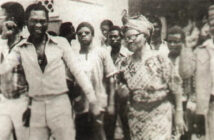By
I came to Brazil expecting to be the object of insatiable female lust. Everything I’d read about the country told me that there would be gorgeous women everywhere in search of a big, strong American Black man.
Journalist Jelani Cobb put a premature end to a number of Brazilian vacations when he got “the real deal on…brothers who travel to Rio for a sex hookup” in his piece for Essence Magazine, “Blame it on Rio,” and more recently, a video made its way around the Internet called “Frustrated: Black American Men in Brazil,” that detailed just how wonderful Brazilian women were and why they were so much better and more loving and more giving than American women. They “knew their place.”
But I was met with a very different reality.
Rather than a land teeming with women desperate for African-American male attention, I found a country full of beautiful women who didn’t know much English, had jobs as lawyers, doctors and engineers, and weren’t all that interested in talking to a stranger who couldn’t speak their language.
Once thought of as a third-world country, Brazil is now home to 2 of the top 15 most expensive cities in the world – Rio de Janeiro and Sao Paulo.
As Brazil’s economics have changed, so too have the draws for visitors, and Black men are no exception.
The Search for Africana
The first African-American man in Brazil I met was Mark Travae, a Detroit native who has been living here since 2004. Travae came to Brazil to study the country’s rich African history after a chance trip to the Shrine of the Black Madonna bookstore in his hometown. “I [was]looking in this Africana encyclopedia, just page after page – Brazil, capoeira, candomble, acaraje, samba, choro, all of this stuff – and I’m like, ‘Wow,’” says Travae.
That was Christmas Eve 1991. Before the end of 1992, Travae says he was on a plane, motivated by a desire to learn about Brazilian culture and Abidas do Nascimento, the Afro-Brazilian philosopher he calls “the closest thing to a Malcolm X” in Brazil.
Spread The Gospel Of American Football
“That Africana book calls Nascimento the most complete black intellectual of the 20th century. I had never heard of the man. I thought, ‘I’ve got to get to Brazil,’” he says. “I studied Portuguese, I read every book I could find…I started buying the music and nine months later I was here.”
Not long after meeting Travae, I had a chance meeting with Casey Frost, a 27 year old from Los Angeles who has been living in Brazil since 2010. Frost moved to Sao Paulo with his Brazilian girlfriend after graduating from Dartmouth and stumbled upon the country’s burgeoning American football scene.
“The ESPN ratings for football started blowing up,” he says, “they started showing all the NFL games, Monday Night Football, Thursday Night Football, all the Sunday Night games.”
Frost joined a team in Sao Paulo as its quarterback and before he knew it he was playing on television and doing segments on Globo Sports, one of the most popular programs in the country. Soon hailed as “the Messiah of American football in Brazil,” Frost even did a commercial for language service Open English.
“All year, I couldn’t go anywhere without people saying, ‘Practice your pronunciation,’” his hammer line from the commercial.
Learning To Communicate
As for visitors, I also met 22-year-old Barack Little, named after a then-University of Chicago Law School professor who his mother admired because he had been the first black president of the Harvard Law Review. Little said what drew him to Rio was, “girls, scenery and then everything else,” but not a for-pay girlfriend experience. While his experience was very different from the one Cobb wrote about in 2008, “every night we faced at least one or two girls, I’d say, that came up asking about money,” he says.
“We’d see girls during the day at maybe a mall or a sightseeing spot and then at night we would see them [again]and they’d start talking about prices,” he says. “That was interesting to us because it seemed – I don’t know exactly who the prostitutes are down there – but it seemed a lot like normal girls might be trying to charge Americans just ‘cause they think we’re rich.’
Little says that while those interactions were a consistent happening during his nine days in Rio, they weren’t a major part of his experience. His favorite part, he says, was being a foreigner for once.
“It had never happened to me in my life, like having to struggle to communicate,” he says. “It was a challenge and it was something that I liked. I definitely understand the position [non-English speakers in the US] are in.”
That’s not to say that the spirit of the Rio sex hookup is dead altogether.
I found T.J. and Eric, from Houston (whose names have been changed), at a bar called Balcony on Copacabana beach. Balcony is owned by an American expatriate and is well known as a draw for Americans and Brazilian garrotas de programa or working girls.
The two young brothas, both in their 30s, told me that they’ve been coming to Rio since 2010, “three, sometimes four times a year” for holidays and long weekends. Both said they had girlfriends in Brazil that they would be meeting up with the next day. About an hour after meeting them outside the restaurant where unauthorized vendors sell beer cans for 5 R$ each, instead of the 9 R$ the bar charges, the pair loaded into a taxi with three ladies who had been working inside.
But even for them, in words, at least, the trip wasn’t just about sex.
“Look around you,” Eric told me when I asked what kept them coming back to Rio. “Look at these beautiful beaches, smell the air, the mountains. This place is beautiful.”
Rio will likely always be beautiful. But as Brazil’s economy continues to progress and education becomes more prevalent in the country, particularly for young women and girls, perhaps the lure of cheap sex will be replaced by the lure of culture, kinship and experience.
Culled from Newsone.com




2 Comments
Great and pretty interesting article. This piece proves that that assumptions can be very misleading and sometimes dangerous.Am sure American tourists are shocked to realise there is more to Brazil than the inciting flesh and pretty faces of Samba girls.Brazil’s economy and its ladies will sure compete with that of any developed nation both in growth and sophistication.
Sure, as the world’s 5th largest economy there is more to the country than flesh and pretty woman.